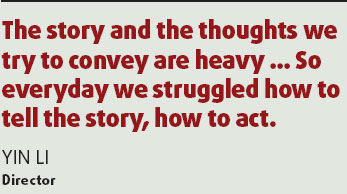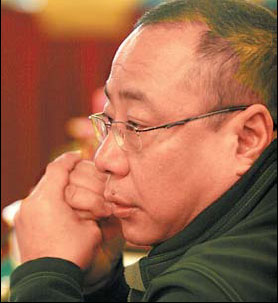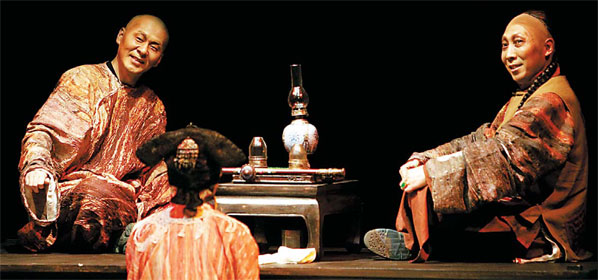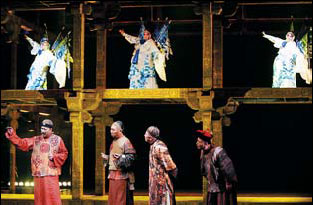History in the remaking
|
Heavenly Dynasty 1900 is about China's history at the turn of the 20th century. |
More than 160 performers, a three-level traditional Chinese block-bracket structure, Peking Opera, acrobatics, martial arts, ballet, choir and videos are all packed into the National Theater of China's latest production, Heavenly Dynasty 1900.
Adapting Li Longyun's 826-page Heavenly Dynasty Upper Nation (Tianchao Shangbang) is a difficult task for any director. The original text explores the social issues and the innate weaknesses of Chinese people at the turn of the 20th century.
In 1900, China, which was ruled by the Qing Dynasty, was a nation in decline. The glory days were behind her. It was heavily controlled by foreign nations who dominated ports such as Shanghai and Tianjin. The Manchu imperial family, a highly conservative court led by the Empress Dowager Cixi, did not pursue reforms, which they thought would weaken their power.

By 1900, the rebellion organized by a movement called Yihetuan, or Boxers' Uprising, had started to spread across northern China. Cixi managed to win them over and encouraged them to attack the foreigners. The army of the dynasty collaborated with the Yihetuan to lay siege to the embassy area for two months, defeating the Europeans. Then an eight-nation force invaded China, extensively damaging the looted Peking and forcing the Qing Dynasty to pay enormous compensation.
Writing a novel on this period was a hard task for Li when he was asked to do so in 1985.
Lao She (1899-1966), the late renowned Chinese playwright, once wrote an autobiographical novel on this subject but could not finish it before he died. So Yu Shizhi, the renowned Chinese actor, asked Li to continue Lao She's work. But it was difficult because "what he wrote was just the beginning of a big work and of the story of his family."
"It was a time that the nation suffered most and the people exposed their soul, weakness and personalities," says Li who finally finished Heavenly Dynasty Upper Nation in 1999.
"I read many books about that history and felt unable to release myself from the stories. Therefore I decided to write my own novel about that time."
Born in 1948 in southern Beijing's Luoquan Hutong, Li identifies with ordinary Beijingers living in small lanes. His best-known work, Xiaojing Lane, which was adapted into a five-act play in 1985, portrays people's lives in Xiaojing Lane from 1949 to 1980, offering insight into the changing attitudes and relationships during years of instability and chaos.

To write Heavenly Dynasty Upper Nation, Li returned to those lanes and talked with old people living there.
"Beijing's history can be touched in the southern lanes. The southern part of the city is a huge museum. Every house tells a story and many details in my novel come from there," Li says.
The sheer scope of Li's novel means that it's a big challenge to adapt for the stage.
Director Yin Li shows the assassination of the German ambassador as the core event leading to the invasion. Two of the leading characters: Qinpu (played by Chen Jianbin) and Enhai (Ni Dahong), both junior officers in the Qing army, initially claim to be the assassin but then deny responsibility when the government pledges to execute the man responsible.
Qinpu and his father (Han Tongsheng) represent the idle Manchus. They enjoy raising birds, watching and singing Peking Opera and smoking opium. Enhai is a nobody who loves pigeons.
Other main characters include Na Laoda (Ma Shuliang) who does everything for money, flatters the foreigners and helps them to suppress the Chinese people; the Manchu noble Master Wen (Niu Piao) who despises the foreigners, telling them China is "the kingdom in the center of the world", declaring that "Chinese were the first people to use paper and invented printing, silk weaving, gunpowder, reading glasses, the magnetic compass and the suspension bridge."
As a veteran movie and TV director, Yin takes an unconventional approach to the 145-minute play. The three-level block-bracket structure divides the stage into more than a dozen spaces where different players perform.
"The story and the thoughts we try to convey are heavy," Yin says.
"Many young actors know little about the history. So everyday we struggled how to tell the story, how to act.
|
A three-level block-bracket structure creates more space for the performers. Photos by Jiang Dong |
"I try to blend a variety of elements into the show. How else could I keep a modern audience's attention for 145 minutes? There should be something entertaining and something that makes them think and laugh."
However, many critics question the rhythm of the play, saying that the plot is too loose and does not lead to a satisfying climax.
"Audience will remember many interesting scenes. But all these scenes are beautiful pearls without being strung together," says Li Jide, deputy editor-in-chief of Chinese Drama magazine.
"I am not quite satisfied with the play. It is more like a gala show than a drama. There are many delicate details and impressive scenes but the entire play is not that good," says actress Feng Xianzhen who acts as Qinpu's mother.
Though the presentation remains controversial, all of the leading performers deserve credit. Chen Jianbin, Ni Dahong, Han Tongsheng, Lei Kesheng, Ma Shuliang, Niu Piao and Feng Xianzhen are among the best theater actors in China.
The show will run at the National Center for the Performing Arts till May 4, except Monday.
(China Daily 04/22/2008 page19)
















